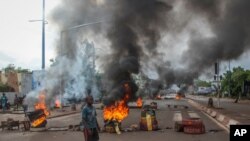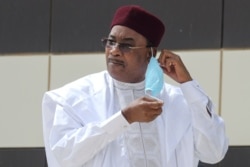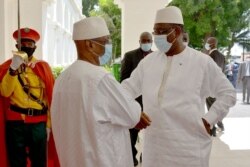Hopes for cooling down Mali's heated political crisis came to nothing Thursday night in Mali's capital, Bamako.
After hours of closed-door meetings, each side held firm on its position.
The M5 Movement still demands that President Ibrahim Boubacar Keita resign. But the demand is a red flag for the ruling party and the regional bloc, the Economic Community of West African States (ECOWAS), which rejects any unconstitutional change among its members.
The presidents of Ghana, Nigeria, Niger, Ivory Coast and Senegal met in Bamako in an effort to ease tensions. The current chair of ECOWAS, Niger President Mahamadou Issoufou, said shortly before leaving Mali that the bloc will take up the crisis again Monday at an extraordinary summit.
Issoufou reaffirmed the need to find a compromise to enable Mali to end this crisis, and felt optimistic that a deal is still reachable.
This is not the first regional effort to ease tensions and quell the deadly protests that have resulted in 11 deaths during the past few weeks. ECOWAS's involvement is seen as biased by many opposition followers who claim heads of state are protecting each other.
However, ECOWAS status and texts clearly mention the defense of the rule of law to prevent unconstitutional change and coups.
"ECOWAS has been building a tradition of involvement, including protocols on good governance and democracy," said Gilles Yabi, founder of WATHI, the Citizen Think Tank of West Africa. If there is no deal, he added, "it would be a difficult option for them because the perception would be bad from the opposition, the M5 Movement and the public opinion."
The June 5 Movement, named after the date when the protests began, has tapped into deep anger over Keita's perceived failure to tackle the struggling economy, corruption and an eight-year jihadist insurrection.
Malians are also angry at the disputed outcome of long-delayed parliamentary elections in March and April that handed victory to Keita's party. The president dissolved the constitutional court in June after it overturned provisional election results.
Dakono Baba, a researcher with the Citizen Observatory on governance and security in Bamako, said even if Keita stays in power, this frustration must be addressed.
People want their leader to improve good governance and fight against impunity in the judicial system, Baba said, adding that the Malian people's frustration needs to be taken into consideration, or tensions could increase.
The opposition M5 Movement stated that its original demand – Keita's resignation – has not changed, but media reports indicate a unity government could be formed, and new judges to the constitutional court appointed.







